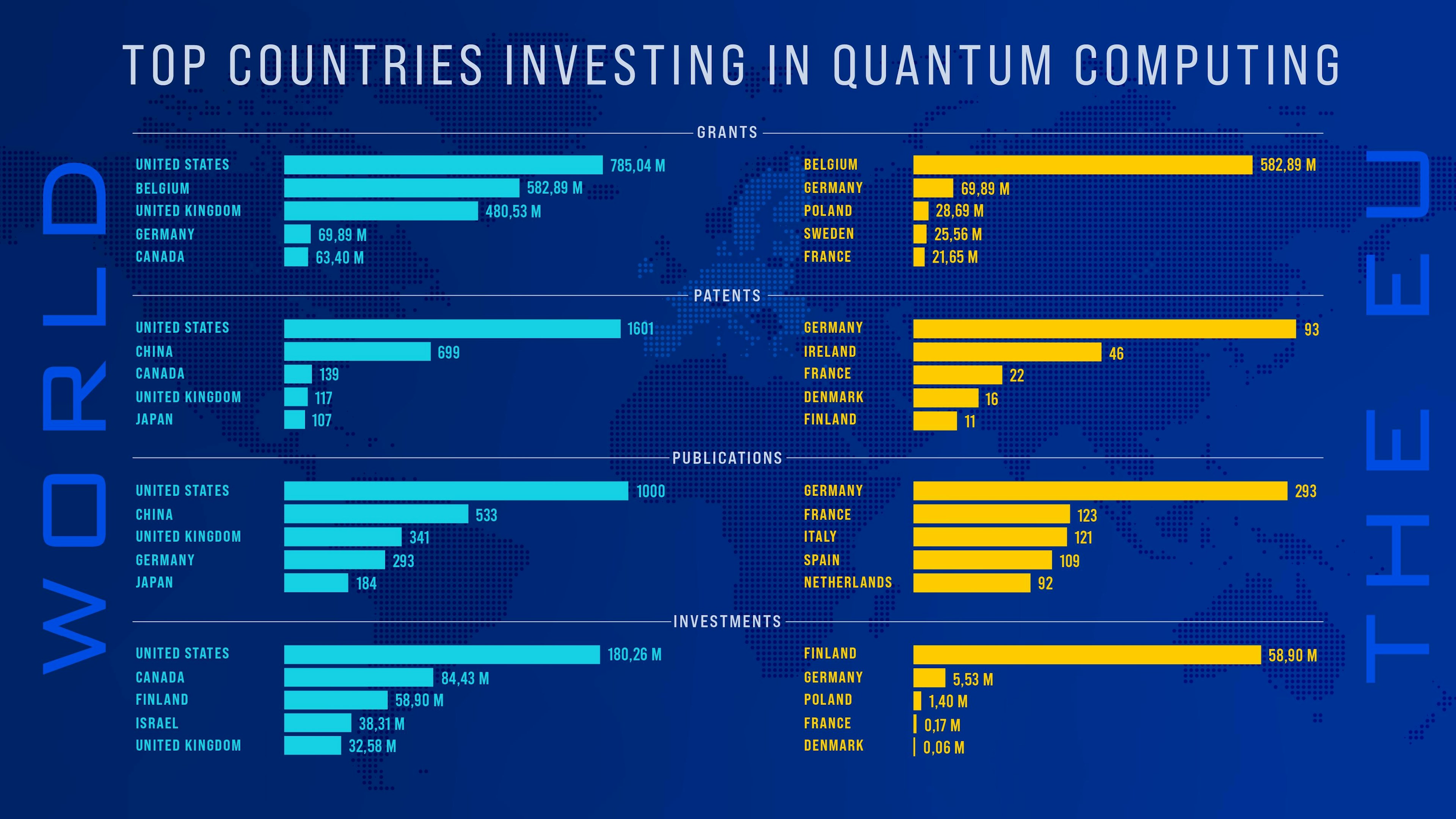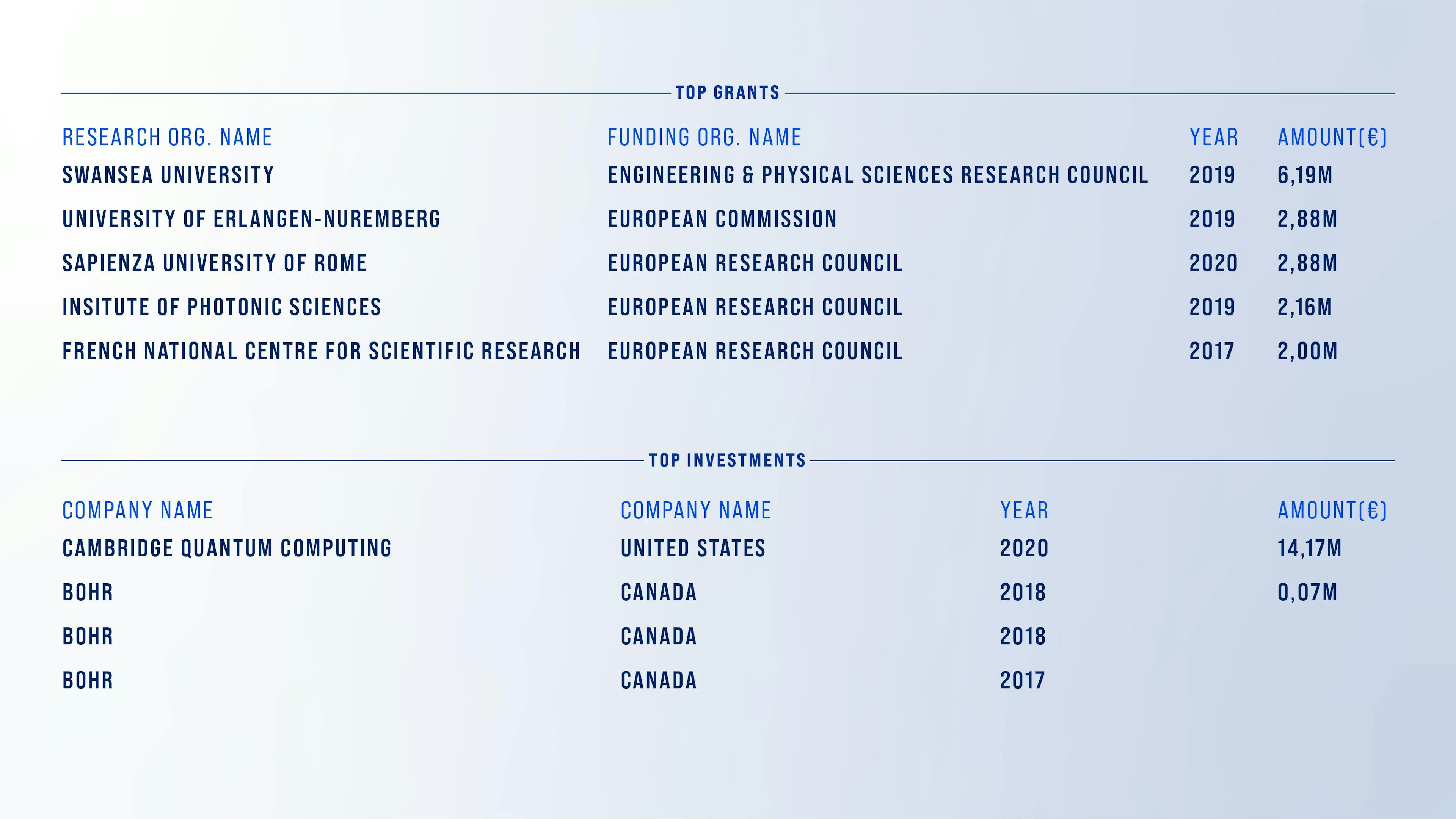State of the EUnion: Quantum Computing

Following its annual “State of the Union” speech, the European Commission unveiled an €8 billion investment plan aiming at maintaining Europe’s leadership in the research and development of high-performance supercomputers. The strategic investment strategy is expected to play a key role in Europe’s pandemic recovery plan.
Two technologies should benefit from this investment: exascale computers—capable of performing more than one billion billion operations per second—and quantum computers.
Let’s dive deeper into the current state of the quantum computing market.
According to L'Atelier’s technology intelligence engine, the quantum computing market is similar to what we’ve seen with blockchain technology. The United States, China and the UK lead in R&D, with the US topping every other country in each category (patents, publications, grants and investments).
Quantum computing leaders in the European Union
Quantum computing has been the target of many public investment strategies throughout 2021, with countries like France and Germany making headlines for respective €1,8 and €2 billion investments towards its development.
This trend has been constant in the last five years; these two countries are the overall European leaders on the subject. Germany is already showing promising results: In June 2021, Angela Merkel unveiled the first quantum computers developed by Fraunhofer-Gesellschaft and American company IBM.

Top countries invested in quantum computing (world and EU). Source: L'Atelier's technology intelligence engine.
Who invests where
Given that it remains in the earliest stages of development, quantum computing is mainly funded through grants. And while the United States has been the highest grantor in the last five years, the European Commission has allocated the highest individual grants to European academic institutions.
Among the beneficiaries, Swansea University recently raised media attention by developing a quantum error-correcting system. The University of Erlangen-Nuremberg has been working on a joint project aimed at creating superconducting quantum circuits. And the French organisation CNRS is working toward quantum supremacy by creating novel infrastructure, incorporating quantum information storage units into the design of efficient quantum memory.
Two main private companies have been targets of investment between 2017 and 2020. The investors are American and Canadian; the startups—Cambridge Quantum Computing and Bohr—both specialise in quantum software. Their algorithms are respectively English and Polish.

Top grants and investments (world), via L'Atelier's technology intelligence engine.
Insights
Our engine is capable of identifying keywords related to a concept. Here’s three technologies connected to quantum computing:
- Unmanned aerial vehicles: The quantum internet might be brought to us… by drones! Scientists are working on satellite-based quantum networks that allow quantum computers to exchange data worldwide, but are facing drawbacks due to cost of launch, and the short period of time that low-orbit satellites can stay in the same place. Chinese researchers are exploring drones instead.
- Super telescopes: Once a quantum internet is created, quantum computing will bring us supertelescopes. Astronomers and researchers are designing quantum hard drives, capable of recording and storing wavelike states of photons that will enable them to create high-resolution images of the universe!
- Tissue engineering: Though still in the early stages of research, quantum computers are seen as a way to improve current work on regenerative medicine and tissue engineering. Most specifically, it could improve current techniques for 3D printing cells and biomaterials.
The article is part two of our series on technologies the EU Commission has prioritised on its “Path to the Digital Decade.” Read part one, on blockchain.
The data is powered by L’Atelier’s technology intelligence engine, which conducts deep quantitative analysis of large distributed datasets related to technology. To learn more, please reach out.
21 Dec 2021
-
Aurore Geraud
Illustrations by Debarpan Das.
The future in your inbox, once a week.
02/03
Related Insights
03/03
L’Atelier is a data intelligence company based in Paris.
We use advanced machine learning and generative AI to identify emerging technologies and analyse their impact on countries, companies, and capital.


